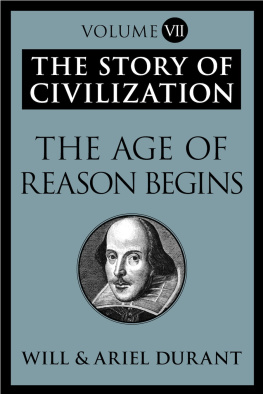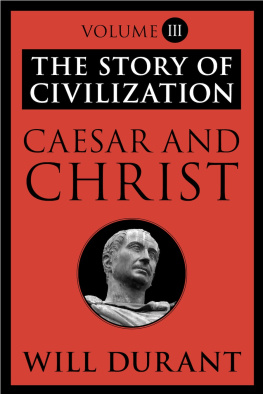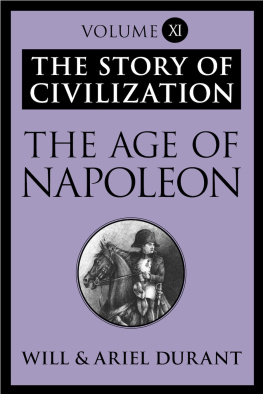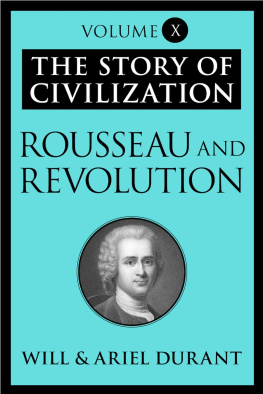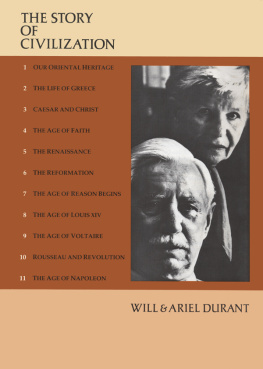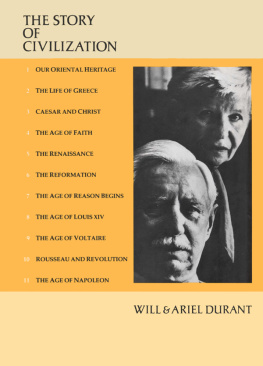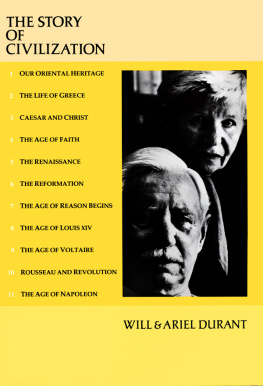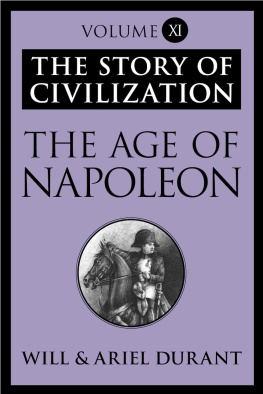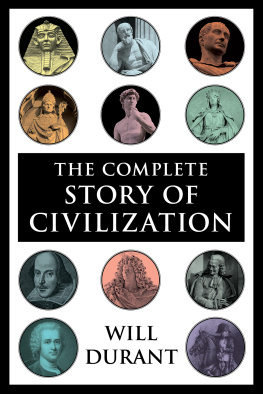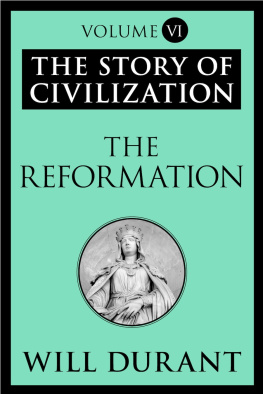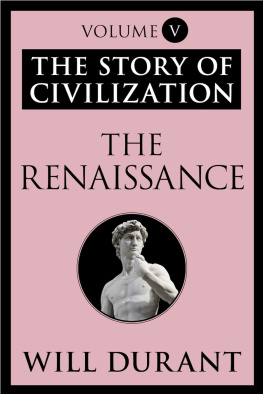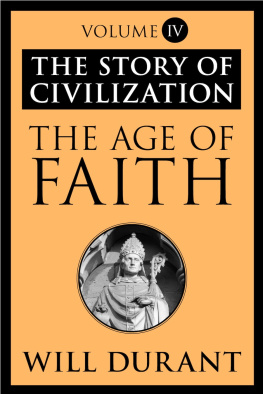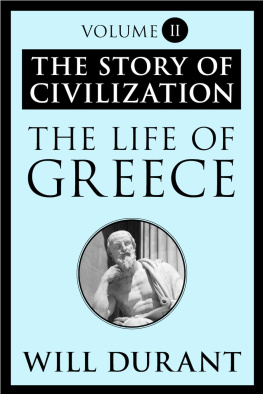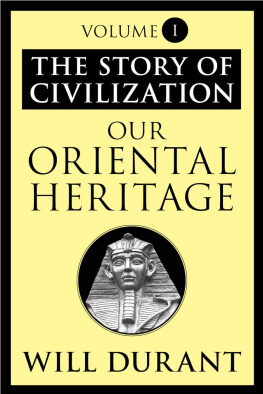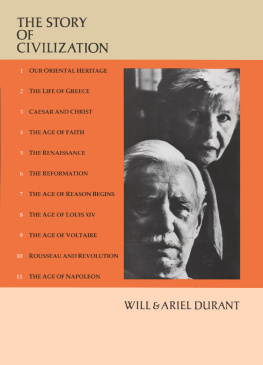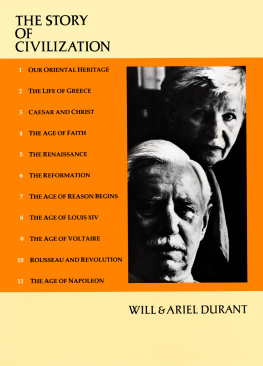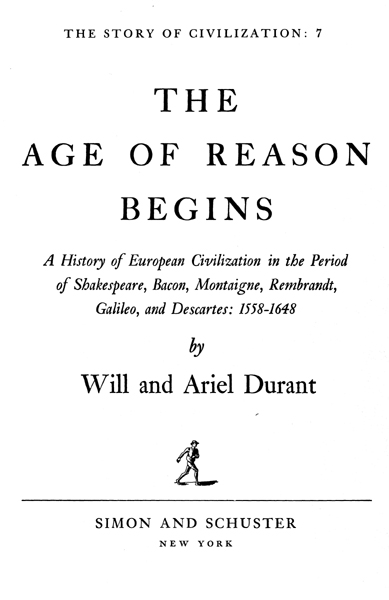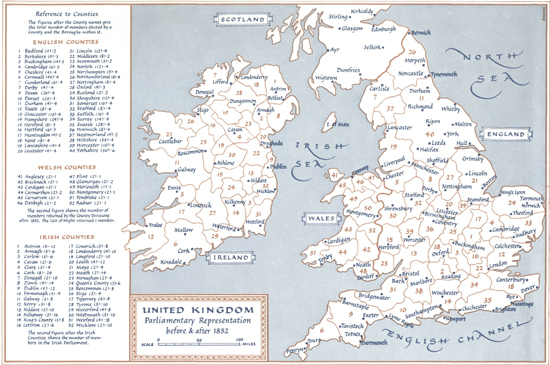
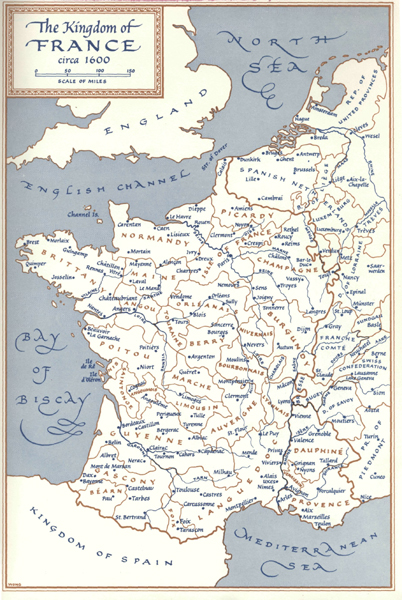
TO OUR BELOVED DAUGHTER
ETHEL
To the Reader
I HAD hoped to conclude my sketch of the history of civilization with a seventh volume to be called The Age of Reason , which was to cover the cultural development of Europe from the accession of Elizabeth I to the outbreak of the French Revolution. But as the story came closer to our own times and interests it presented an ever greater number of personalities and events still vitally influential today; and these demanded no mere lifeless chronicle, but a humanizing visualization which in turn demanded space. Hence these reams. What had begun as a final volume has swollen into three, and one of the present authors, at an unseemly age, becomes a prima donna making a succession of farewell tours.
Two of these three volumes have been completed in their first draft; one has been rewritten, and it here ventures into print. It proposes to cover the history of economic life, statesmanship, religion, morals, manners, music, art, literature, science, and philosophy in all the countries of Europe, and in the Islam of Turkey and Persia, from the accession of Elizabeth I (1558) and the births of Bacon (1561) and Shakespeare (1564) to the Treaty of Westphalia (1648) and the deaths of Galileo (1642) and Descartes (1650). In this period the basic developments were the rise of murderous nationalisms and the decline of murderous theologies.
Barring some lethal surprise to the authors or to civilization, Volume VIII, The Age of Louis XIV , should be ready in 1963; and if decay permits, a final volume, The Age of Voltaire , will appear in 1965. The unifying theme of all three volumes will be the growth of reason.
There is no attempt, in these volumes or their predecessors, to rely predominantly upon contemporary sources and documents for political or economic or military history; to do this for all the nations of Asia and Europe through all their generations and all their activities would have been physically impossible in one lifetime. But in cultural history, which is the primary concern of this record, there has been an almost complete resort to the original sources: every major religion has been studied in its main habitat, every major work of literature has been read or reread, every major work of art has been visited, every important contribution to philosophy has been explored.
Since the great debate between religion and science is the main current in the stream of modern thought, it will be recorded in these pages more frankly than may seem wise to men of the world. These have long since concluded that religious beliefs fill too vital a function in sustaining individual morality and morale, and social order and control, to justify their disturbance by public discussion. Much can be said for this point of view, and we shall find some of our dramatis personae expressing it; but obviously it cannot release the historian from his obligation to find and describe the fundamental processes in the cultural history of modern Europe. It can, however, obligate him to impartiality in selecting and presenting the facts and personalities according to their influence in shaping events and results. We shall hear Pascal and Bossuet as well as Spinoza and Voltaire.
Grateful acknowledgment is due to our daughter Ethel, who typed with patient care and skill the hardly legible second draft and corrected some of my errors; to Dr. C. Edward Hopkin, and to Flora, Sarah, Mary, and Harry Kaufman, for help in classifying the material.
Mrs. Durants part in these concluding volumes has been so substantial that our names must be united on the title page.
W ILL D URANT
Los Angeles, May 1961
NOTES ON THE USE OF THIS BOOK
1. Dates of birth and death are usually omitted from the narrative, but will be found in the Index.
2. Monetary equivalents as between past and present are guesswork, made doubly hazardous by periodic inflation. We note that an able seamans pay per day in the England of 1540 was sixpence, and in 1880 six shillingsa twelvefold increase (Froude, The Reign of Elizabeth , V, 385). Hume calculated that prices had risen threefold in England between 1492 and 1740 (Essays , 175); we may conservatively reckon prices to have risen another threefold between 1740 and 1960, and therefore nine times since 1492. We may in general assume that coins had, in seventeenth-century Europe, approximately ten times their present purchasing power. The reader may use the following rough equivalents, as between 1600 and 1960, in terms of the currency of the United States of America:
crown, $12.50 | gulden, $10.50 | pound, $50.00 |
ducat, $12.50 | livre, $12.50 | reale, $.50 |
cu, $8.00l | louis gold, $50.00 | ruble, $10.00 |
florin, $12.50 | maravedi, $.015 | scudo, $1.16 |
franc, $2.50 | mark, $33.33 | shilling, $2.50 |
guilder, $10.50 | penny, $.20 | thaler, $10.00 |
guinea, $52.50 |
3. The location of works of art, when not indicated in the text, will usually be found in the Notes. In allocating such works, the name of the city will imply its leading gallery, as follows:
AmsterdamRijksmuseum | FerraraGalleria Estense |
BerlinStaatsmuseum | FrankfurtStdelsches Kunstinstitut |
BolognaAccademia di Belle Arti | GenevaMuse dArt et dHistoire |
BrusselsMuseum | HaarlemFrans Hals Museum |
BudapestMuseum of Fine Arts | The HagueMauritshuis |
CasselMuseum | Kansas CityNelson Gallery |
ChantillyMuse Cond | LeningradHermitage |
ChatsworthDuke of Devonshire Collection | LisbonNational Museum |
LondonNational Gallery | ChicagoArt Institute |
MadridPrado | CincinnatiArt Institute |
MilanBrera | ClevelandMuseum of Art |
MinneapolisInstitute of Arts | DetroitInstitute of Art |
MunichHaus der Kunst | DresdenGemlde-Galerie |
NaplesMuseo Nazionale | DulwichCollege Gallery |
New YorkMetropolitan Museum of Art | EdinburghNational Gallery |
NurembergGermanisches Nationalmuseum | PhiladelphiaJohnson Collection |
Sarasota, Fla.Ringling Museum of Art | SevilleArt Museum |
RouenMuse Municipale | StockholmNational Museum |
St. LouisArt Museum | ViennaKunsthistorisches Museum |
San DiegoFine Arts Gallery | WashingtonNational Gallery |
San FranciscoDe Young Museum |
Passages in reduced type are especially dull and recondite, and are not essential to the general picture of the age.

